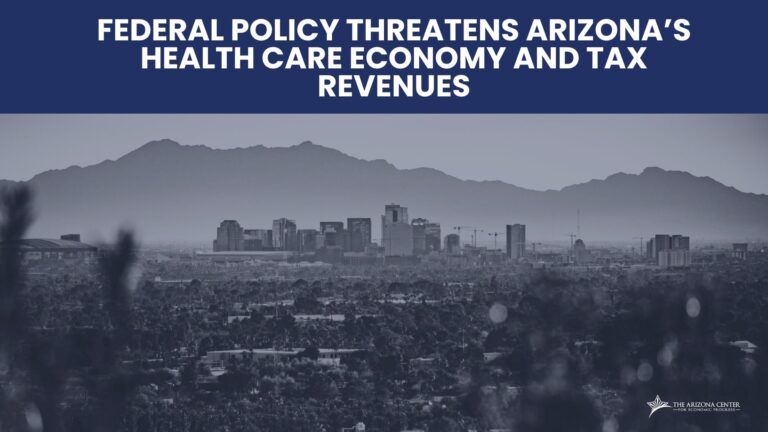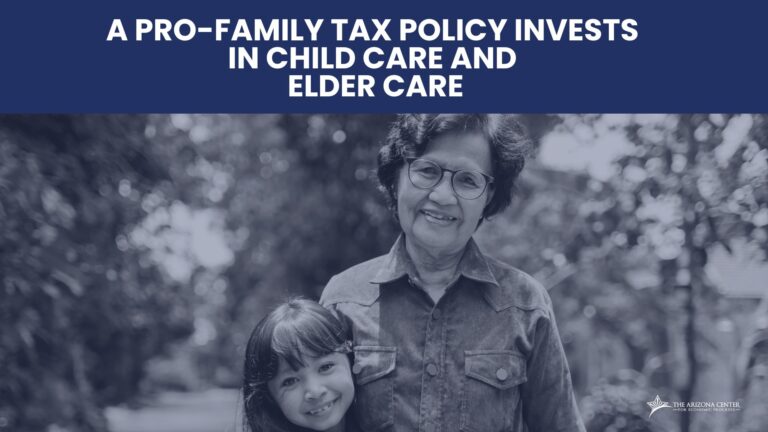
Bridging the gaps to the COVID-19 response
Arizona should have people-driven policies and public investments to stabilize incomes, prevent job loss, provide for basic needs, and preserve state resources. While Congress and the state legislature have taken important steps recently, many gaps remain, and more will emerge as this the economic fallout deepens.
Pay Arizona’s affected workers
Close access gaps to paid medical and family leave
Congress has guaranteed two weeks of paid leave to people who are sick, quarantined, or caring for someone with COVID-19. Parents can also take up to three months of paid leave ($200 daily maximum) during school closures. Yet, many businesses are exempt from these provisions, and many caregivers of the elderly or those with disabilities have no options and must stay home. Congress should address these gaps to guarantee paid family and medical leave to many more workers. And if the federal action doesn’t go far enough, Arizona should enact a statewide paid family leave program, like those created Washington State and Oregon.
Raise Arizona’s weekly unemployment benefit
Newly enacted Unemployment Insurance (UI) measures increased weekly benefit amounts by $600 per week, added 13 weeks of benefits, and expanded eligibility to employees not previously covered by UI. Yet, much more will be needed to keep Arizonans afloat beyond the immediate public health emergency. Weekly unemployment claims in Arizona have skyrocketed to over 80,000 (8 times the peak weekly claim during the Great Recession). After the health crisis ends, Congress should extend the benefit expansion if economic conditions warrant. Arizona lawmakers should support workers by raising the state benefit amount (second-lowest in the U.S.) and lowering the wage threshold to qualify (highest in the U.S.).
Shore up the social safety net in Arizona
Raise SNAP benefits
The federal government has allowed additional flexibilities for Arizonans to enroll in the Supplemental Nutrition Assistance Program (SNAP) as well as the Women, Infants, and Children (WIC) supplement. However, unlike during the Great Recession, Congress has neglected to increase SNAP benefits. Increasing SNAP benefits is crucial to help struggling families put food on the table and to help boost spending the economy needs during the crisis. In addition to raising the benefit amount, state officials in Arizona should work to eliminate barriers to enrolling in and maintaining the flow of benefits.
Replenish Arizona’s Housing Trust Fund and expand the statewide eviction ban
While Congress and the Arizona state government have mobilized resources for housing stability during the crisis, policymakers must do more to address homelessness and affordability. In addition to near-term resources, Arizona should replenish its Housing Trust Fund to assist low-income residents and those at risk of eviction or experiencing homelessness (as many legislators have already proposed). And while the Governor has paused eviction enforcement, other parts of the eviction process should be halted as Arizonans will have greater difficulty working, caring for their children, and staying healthy if they don’t have a safe place to live or are worried about losing their housing.
Increase Arizona’s monthly family income benefit and time limits
During the crisis, low-income families with minor children will experience significant financial strain. The Temporary Assistance for Needy Families (TANF) program in Arizona, while among the most restricted and limited, can provide cash assistance or subsidized employment for these families. While TANF was boosted with an Emergency Fund during the Great Recession, no such investment has been made for the current crisis. In addition to other stimulus, Congress should enact an expansion to provide extra support to these families. Arizona, meanwhile, should re-allocate its grant toward cash assistance, expand eligibility, and retain families’ enrollment.
Fund child care capacity during the recovery
When social distancing guidelines are relaxed and more parents are ready to return to work, the lack of child care access (vastly underfunded in Arizona even before the crisis) may hinder many from doing so. Congress and the Arizona state government should act to accelerate the re-opening by directing resources so that child care providers can survive this economic crisis and do not shutter permanently. In addition, child care subsidies should be increased during the recovery so that workers can afford this option while returning to their places of employment.
Focus on Arizonans with social and economic barriers
Protect justice involved individuals by seeking alternatives to imprisonment
While Congress increased funding to mitigate threats to inmate health and safety (including issuing guidance for release or home confinement), Arizona’s action plan largely focuses on restricting visitation and inmate movement. The state’s response must go further to protect the incarcerated population by limiting inflow and accelerating outflow. Arizona can limit new admissions by seeking alternatives for nonviolent offenders or reclassifying misdemeanor offenses. The state can also slow the spread among the currently incarcerated by immediately releasing vulnerable populations (as defined by the CDC), minimizing caseloads for probation and parole, and eliminating revocations for technical violations.
Help all student loan borrowers by expanding relief
While Congress suspended payments for federally backed loans through the end of September, lawmakers should enact equitable solutions for students regardless of their repayment status and origin of the loan, including forgiveness, including millions of borrowers with private loans and those already struggling to pay. Congress needs to pass legislation that provides targeted aid at borrowers already in default or at greater risk of defaulting. This could include improving repayment options and eliminating fees and capitalized interest, or the cancellation of a specified amount of student debt.
Lower barriers to relief for immigrants
Healthcare and economic relief during the crisis should be provided regardless of immigration status or other exclusions. Instead, millions of taxpaying undocumented and immigrant workers have been left out of federal legislation, even as they face some of the highest rates of job loss. To effectively address the public health crisis, federal and state relief efforts should broaden access to emergency Medicaid, remove the Social Security number requirements for the stimulus checks, and renew automatic work permits to ensure immigrants awaiting reauthorization are not at risk of losing benefits.
Invest in recovery for Indian Country
Although tribal nations are more at risk of COVID-19 due to the elevated rates of chronic diseases and uneven access to healthcare services, the federal government has been slow to assist tribes. While the $8 billion in federal funding allocated for Native American programs will increase tribes’ effectiveness to address the spread of the virus, persistent poverty, poor health, and substandard housing and education will remain due to long-term underfunding. Tribal governments should be supported with targeted economic and social support for their members, such as desperately needed infrastructure projects in Indian Country to increase jobs and economic development.
Target relief and stimulus to all low-income households
While the federal government has taken several positive steps to support workers and families, efforts to prevent widespread hardship in the coming weeks, months, and years are far from complete. The stimulus check eligibility and process impose significant barriers for immigrant families, children in mixed-status households, dependents over the age of 17 and elderly dependents, and requires all recipients to file tax returns to qualify (regardless of ability to do so). Congress should make special efforts to expand the eligibility for relief and accommodate those with barriers to the extent possible.
Preserve Arizona’s fiscal health
Invest in people-driven priorities and safeguard revenue
As a result of the crisis, Arizona state revenue will likely plummet, perhaps more than during the Great Recession. State budget and tax policy decisions during the economic crisis will determine how and when Arizona’s economy will recover. Unlike the Great Recession and aftermath, Arizona must maintain funding for public schools, community colleges, universities, housing, child care, healthcare and other people-driven priorities to build a stronger workforce and new economic activity. While Congress may help the state brace for shortfall, much more federal aid will likely be needed. Arizona’s lawmakers must respond with good stewardship of existing revenue by stopping all new tax cuts and raising new revenue from a fairer tax code.



